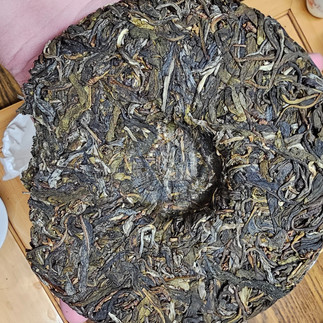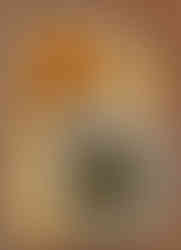Luxury for Less: Mikazuki Tea House's Little Bingdao Sheng Puerh Review
- Neldon Hamblin

- Apr 29, 2024
- 7 min read
Updated: Apr 10, 2025
Hey, friends! Happy Monday!
Today's post is a 2023 spring sheng puerh tea review from Mikazuki Tea House in Japan. You might recognize them from their thirst traps of green-label and vintage yixing pots, their gorgeous photography of their antique and vintage teawares, or their mysterious allure from their selectively-curated collection of aged teas on Instagram. They've long been a page I've stalked and watched, lurking like the luxury lover I am, waiting until the perfect items arrived in stock. Well, back in February, I managed to purchase an absolutely gorgeous antique wooden box (shown below and currently used to house my precious teas), an 80's/early 90's MengChen tribute yixing teapot, as well as some of their tea offerings (you can see my reel on the teapot and teas here), and J (the owner) was kind enough to send me quite a few extras. One of these extras he threw my way was the then-unreleased sheng puerh he had commissioned, as he wanted my thoughts on it.
The cake itself is made from material out of the Měngkù area of Lincang, specifically in the xiǎo bīngdǎo ("little Iceland" ) area. According to Mikazuki, "this region has similar growing conditions to what you might find in bingdao; the cold climate here produces tea leaves that grow and mature more slowly and appear thicker. The leaves used are from what is known as 藤條茶 (teng tiao cha, or "rattan tea")." Teng Tiao Cha is fascinating and warrants its own post, though for a brief primer, it's basically where every tea leaf is plucked except for the one at the end of the tea plant, causing the tea to grow slower and longer and lower to the ground, resulting in the "vine" or "rattan" tea. Teng Tiao Cha tends to be thicker and more serpentine-looking, rougher leaves, though do not be fooled by their appearance, as these leaves pack quite the powerful punch of flavor, being well known for a strong 厚韵 (hou yun, "throat charm"). I'll get into this more, but it's a similar abstract concept to yan yun, in the sense that describing the indescribable presents a challenge; essentially, I like to describe hou yun as the way it feels when breathing in after sipping the puerh- as you swallow the tea, it feels almost cloud-like as the flavor expands, going both down the gullet and upwards towards the sinuses- like a flavorful, cooling wave of mist going both down and up, resulting in a nice, lingering flavor with a fun body feel. It's better felt than described, in all honesty, and the subject of puerh terminology deserves another post entirely.
So, if I got this tea back in February, why am I just now posting the review? Well, I've waited to post this review until he officially made the cake available to purchase, as I would hate to review a tea that would be unavailable to most- so hence the post now, at the end of April. I hope you enjoy!
Without further ado, let's get into this review.
Brewing Parameters:
10g leaf
150ml porcelain gaiwan
100C/212F spring water
Dry leaves: The first thing I noticed when I got my package in February was the insanely enticing and strong floral aroma coming from the box; the cake itself is just so potently fresh and sweet. The dried leaves smell intensely fruity and floral, like orchids and magnolia blossoms, as well as dried fruits.
Warmed Gaiwan: The leaves smell fresh; there's a pleasant sugarcane, rock sugar, and magnolia blossom florality to these leaves. There's also a nice note of plums and ripe peaches, combined with a sort-of fruit leather aroma.

Rinse 5s: The leaves smell fresh- there's a slight adzuki starchiness to them. There's a lovely floral and light smokiness to it. This rinse brewed up surprisingly golden for what it is. Flavor wise, there's a nice minerality to it with a slight starchiness with an almost sandalwood
incense-y flavor to it. I also noticed a nice nougat-like flavor to it. Despite being a rinse, this is intensely salivating and has that typical bingdao mouth cooling effect with each breath in. There's also an intense clover and black licorice aroma in the cup.
1st Steep 10s: The brew is slightly darker now with a lovely golden color to it. Flavor wise, this first steep has that starchiness to it with a nice vegetal sweetness underlying it. It has a slightly bitter twang to it, but this melts into an immediate and strong cooling sensation, coupled with that intense salivating rock sugar and intense honeyed sweetness. There's a slight citric brightness to it with a flavor that reminds me of ripe cherries and fruit leather. The leaves themselves smell like sugar-coated, candied spinach. It has a lovely feeling energy too and I can tell this will only continue to build.

2nd Steep 15s: This steep has slightly stronger bitterness but with a light drying astringency to the roof of the mouth. It's still got lots of that strong honey sweetness. There's a flavor that reminds me of granny smith apples and sandalwood that coats the tongue in a saliva-stimulating starchiness. There are also nice notes of orchid and stone fruits and that lovely bingdao cooling sensation. Texturally, it's a nice, slick, oily tea that makes me want to chug more.
3rd Steep 20s: There's that fleeting bitterness that transforms into an intense sweetness. The saliva stimulation of this tea is absolutely insane, making my tongue feel like it's coated in honey water, specifically concentrated along the sides and tip of my tongue. This, friends, is a great sign for sheng- that saliva stimulation is something I love in a nice sheng. As I exhale, I get a nice, floral fruitiness, but as I breathe in, there's that strong cooling sensation. This is the steep where the sweetness really comes into power. It's got a nice, warm sinking qi in the stomach, with notes of vegetal greens and clover honey or rock sugar.

4th Steep 25s: Again with the fleeting bitterness- it's slightly stronger with that vegetal and green flavor, but the sugarcane sweetness still comes through strong. It's also still incredibly mouthwateringly salivating, making me want to just chug and chug this tea. I'm still noting that warming stomach feeling, too, or the tea energy. There's a slightly stronger astringency this steep, primarily drying the roof of the mouth and on the tip of the tongue, but the salivating slickness of this tea makes it all worth it.
5th Steep 35s: The hou yun is strongggg here. There's a nice sweetness, though now I'm noticing more of a cooling feeling as I swallow the tea. Wildly, this tea has brewed up a dark, golden orange. It's very vegetal and floral forward with a slightly stronger bitterness- which is great, as it keeps the session interesting and isn't overwhelmingly bitter like a bulang or a laoman'E.
6th steep 45s: This steep is still crazy sweet. I'm getting more notes of green grapes, roses, and interestingly enough, apple skins and that sort of starchiness that you get when eating a nice crisp apple. There's still that bingdao cooling note. The flavors are more subdued and the tea itself is slightly thinner- being more creamy but thin- and my teeth almost feel like they're coated in starch (possibly from the tannins and astringency?). The clover note has returned as well.

7th Steep 60s: It's starting to die here and has shifted back to the luxurious golden color I'm familiar with. There's still that nice cooling note with the lingering hou yun, though more concentrated towards a cooling of the throat and stomach as I sip. It's still sweet and feels thinner, almost like I'm brewing up floral sugar water now.
Here is where the tasting notes end, as well as the photos on the gongfu table- I ended up drinking just over 2L of this tea, getting 10 steeps total. Towards those last few steeps, it was mostly one-sided sugar water, but was still crazy salivating and made me keep chugging this tea. Thus, the picture here is from a different setting, being my gongfu setup at work. This tea is seriously one of the few shengs I've had that has that strong saliva-stimulating flavor force. So, so tasty.

Final Thoughts:
This tea is phenomenal, especially at the price. While not being true bingdao material, it is grown in an area close enough to retain some of those classic bingdao characteristics, notably the mouthwatering sweetness and unique cooling experience. At the introductory price of $30 a cake (which raises to the standard price of $42/cake starting May 1st), with each cake being 200g, this tea breaks down to be $0.15/g on sale, which will go up to $0.21/g (21 cents a gram) for the normal price, an incredibly realistic and reasonable price for such a lovely tea. With this tea, you're sipping an affordable luxury- you get the feeling of bingdao without the pricetag. The flavors are complex and this is honestly the first young sheng I've had with such a strong hou yun. If you're wanting a tea that delivers, this is it.
Ultimately, this is a fantastic and affordable daily-drinking sheng puerh that I can see aging quite nicely. I think some of the more floral notes will eventually soften to become more fruit-leather like, with some of the vegetal notes also transforming with time into something more honeyed. This manages to be a great beginner-friendly young sheng while also having enough of an intriguing depth for seasoned tea drinkers and puerh lovers- so if you're a seasoned sheng sipper or a beginner to the world of puerh, this tea has characteristics that will entice you. I personally might have to tong this tea for future storage, honestly. It really is quite the quality sheng and Mikazuki Tea really has lived up to the hype generated by their mysterious allure, especially by offering this luxury for less and allowing those without deeper pockets to see why Bingdao and the surrounding area is so famed.
You can place an order through DM on Instagram and eventually on their website as it is completed. J is extremely helpful and knowledgeable and is such a delight to chat with, plus shipping from Japan was lightning fast (arriving in under a week), making for a truly wonderful experience.




























Comments